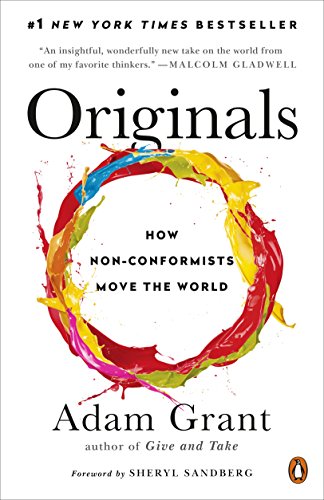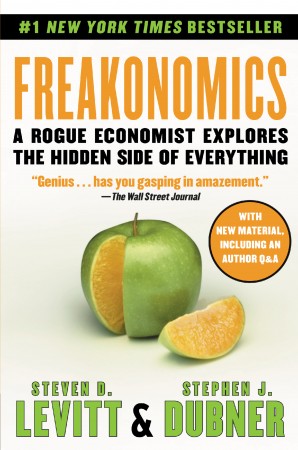In this post, I am going to share with you some of the influencers I follow to stay updated with leadership, storytelling, and other topics that are very important to any Product Manager (and really to anyone who wants to be a better professional).
Like me, you may be eager to get great mentorship. Although the best mentorship comes from having awesome peers, it could come in many other forms. There is great mentorship out there, from public figures. Over time, I built a great collection of sources that help me stay updated. I will share these sources in my blog. Stay tuned, you could also benefit from them.
Leadership lessons from Adam Grant
A few months ago, I did not even know of Adam Grant. I was introduced to him in my Leadership Development course, which was part of my MBA program at C.T. Bauer College of Business (awesome course and awesome professor Chet Miller, by the way. I may talk about him in a later post).
In this course, we used extensively one of Adam's books, Originals. As the weeks unfolded, I became more and more engaged with the material, especially this book. The book challenges ingrained beliefs and introduces many concepts all backed with data from trusted studies and years of research.

Adam starts the book talking about how originals find faults in defaults (i.e.: challenge status quo). He exemplifies this with a study that can predict job performance just by knowing what Web browser the employee uses. People who used Chrome and Firefox (i.e.: non-default browsers) in customer service and call center jobs were better performers on the job and stayed 15 percent longer.
He introduces a concept called Vuja De. This concept describes a trait in which creative people gain new insights into old problems by looking at something familiar with a fresh perspective.
Adam found that originals nurture both breadth and depth of experience. They are fascinated by the expression of ideas and emotions through images, sounds, and words (i.e.: music, arts, crafts, writing, and performing). And they master their field of study deeply.
Adam challenges what Simon Sinek keeps reminding us: "Start with why". Adam encourages us to shift the focus from why to how in some situations (I bet that Simon would not disagree). Adam refers to this as tempered radicalism. The logic behind this is that some ideas are so grandiose that they become so much of a leap for those conformists. One way to unfreeze them is by focusing on how we will do it instead of why we are doing it. Take, for example, autonomous cars. By drafting the plan of how to introduce autonomous cars, you might enlist many conformists that you would not if you told them that we need autonomous cars to solve problems like traffic or the environment.
Adam talks about many more ideas in his book. I really recommend reading it. It was a big-time eye-opener for me.
If you cannot be bothered or do not have time to read the book, Adam's podcast is really good too. It covers some of the concepts that are introduced in the book. My top three episodes are probably these: "The Perils of Following Your Career Passion," "How to Love Criticism," and "Become Friends with Your Rivals." The episode "Bonus: A debate with Malcolm Gladwell" is unmissable. It is a casual and fun conversation between two great characters: Adam Grant and Malcolm Gladwell.

Adam is very active in his Twitter and his LinkedIn. You can follow him and stay updated with his work and ideas. Or you can subscribe to "Granted," his monthly newsletter (subscribe in adamgrant.net).
Freakonomics, a brilliant example of how to use data to explain things
I came across the "Freakonomics" book because of my interest in using data to draw conclusions (i.e., data science). A colleague of mine recommended it to me together with "Super Crunchers" (which I have not read yet). I was fascinated about how the authors of Freakonomics, Steven D. Levitt and Stephen J. Dubner, draw incredible insights by asking the right questions to large-quality datasets. They cover a wide variety of topics including the inner workings of a crack gang, the truth about real-estate agents, and the secrets of the Ku Klux Klan. The one topic that really resonated with me is how they link the reduction in crime, and it was crazy high in the nineties, with abortion laws from the seventies.

The book is great but what really hooked me up was the Freakonomics podcast. In the podcast, the Freakonomics co-author Stephen J. Dubner does incredible job storytelling about insights drawn from a wide range of sources (e.g.: studies, datasets...). He does that by talking to the people responsible for such sources. My top three episodes so far are: "Where Do Good Ideas Come From?," "A Good Idea Is Not Good Enough," and "Here’s Why All Your Projects Are Always Late — and What to Do About It". There are episodes about all kinds of topics but, as you see, you can find the ones that are very relevant to you. In this case, my top three are about creativity and project management, very relevant to what I do (i.e., Product Management).
If you are thirsty for frequent updates, you can follow Freakonomics on Twitter or Stephen Dubner on LinkedIn.
The art of storytelling, by Paul Smith
I learned about my last influencer, Paul Smith, in my leadership course. The course introduced how learning to be charismatic (yes, it can be learned) is critical to becoming a great leader. One of the learning tactics is storytelling. And the book "Lead with a Story," by Paul Smith, does a great job walking you through how to become a good storyteller... or so I was told, I have not read it, to be honest with you .

However, this got me interested in Paul Smith. I found that Paul has a podcast about "Lead with a Story". The first episode I listened to already got me. In this episode, Paul's son is learning how to play a new instrument. He tells his father that "I'm going to learn to play the euphonium!" Then, Paul says "Uh, what’s a euphonium?" His son explains that "It’s like a small tuba that makes higher notes." To this, Paul had no further questions about the instrument. That is the power of using metaphors. The podcast contains very many episodes in which Paul has casual conversations with guests about how to use storytelling in business.
Besides his podcast, I found that Paul has a number of courses in LinkedIn Learning. These courses are videos that go usually for one or two hours. They provide ready-to-use stories and how-to guides to create your own stories for different settings (e.g.: sales, leadership...). I really recommend taking them.
That's all folks!
I hope you are enjoying reading my posts. I would love hearing what you think about these guys and/or what other means you use to stay updated.
Don't miss my next post! I am going to talk about how to approach Free Trials for SaaS products.
I'll be waiting for you!
